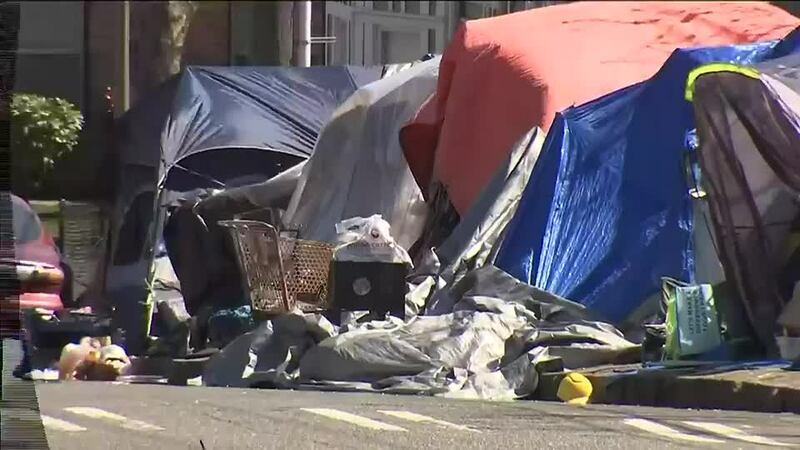TACOMA, Wash. — Temporary hand-washing stations, toilets and trash bins will appear near two major homeless encampments in Tacoma.
The city is expanding its Hygiene Pilot Program to a 34-tent encampment near the Evergreen State College campus along 6th and 7th Street in downtown Tacoma.
The utilities also will be installed near a 52-tent encampment under I-705 near A Street.
That will make three hygiene stations in Tacoma. The first one opened at 8th and Yakima and has been operating since March 5.
[DOWNLOAD: Free KIRO 7 News app for alerts as news breaks]
The stations are expected to operate until the week of July 19, 2021.
The cost is $75,000 per month — $225,000 for the next three months — to operate the three locations, which includes daily security from 6 p.m. to 6 a.m.
When choosing the new locations, city staff considered the size of encampments, calls for services from businesses, input from the Homeless Outreach Team and whether the site has space for vehicles to collect trash.
The Hygiene Pilot Program is meant to provide basic needs for people experiencing homelessness while the city searches for a site for a new low-barrier shelter. Right now, the city is considering two properties for the shelter.
The city introduced the pilot in large part because of the COVID-19 pandemic, in which public libraries and restrooms are currently not available. The Center for Disease Control and Prevention encourages finding ways to provide people experiencing homeless with access to hygiene facilities during the pandemic.
“It’s not the best way to spend our money, but given the guidelines from the CDC, it’s what we can do while we’re finding additional sites to do something better than what we have now,” Mayor Victoria Woodards said in a meeting earlier this month.
ARE THE HYGIENE STATIONS WORKING?
In a meeting April 6, city staff recommended to City Council that the pilot be expanded to three locations after a one-month review of the station at 8th and Yakima.
Linda Stewart, director of the city’s Neighborhood and Community Services Department, said she felt the program has been successful because the people living at the encampments say they’re using the facilities.
“I would call that a success for the people who want to use the services,” Stewart said.
Stewart also reported that the encampment at 8th and Yakima has not grown in the time after the hygiene station was placed and that 311 calls to the city for non-emergency services have decreased. She added that 911 calls have increased, primarily due to welfare checks.
Some Council members at the April 6 meeting questioned whether the program has been successful.
Council member Lillian Hunter said she was still receiving complaints from neighbors of people defecating near their properties.
“I think the success of the pilot is a little bit subjective depending on where you stand in the situation,” she said at the meeting.
Hunter spoke of previous instances where she heard portable bathrooms had been locked by people and asked if it was happening at this location. Stewart said there was one instance where a padlock was on the bathroom, but that it was removed immediately.
[SIGN UP: KIRO 7 Daily Headlines Newsletter]
“We have not heard any evidence that there’s been any inappropriate use of the facilities,” she told Council.
Council members Robert Thoms was concerned with the increase in 911 calls and made a case for the residents living near the hygiene station.
“I would argue that the surrounding community is just as important as the community being served,” he said.
City staff said they plan to conduct community outreach for the new locations.
Staff told The News Tribune on Monday that the city is exploring location of facilities and vendor agreements for the two new sites.
Deputy Mayor Keith Blocker said the hygiene stations aren’t going to solve the problem of homelessness but are necessary as the Council works on a larger comprehensive strategy that will include the new low-barrier shelter site.
“I just think it’s a step in the right direction,” he said.








